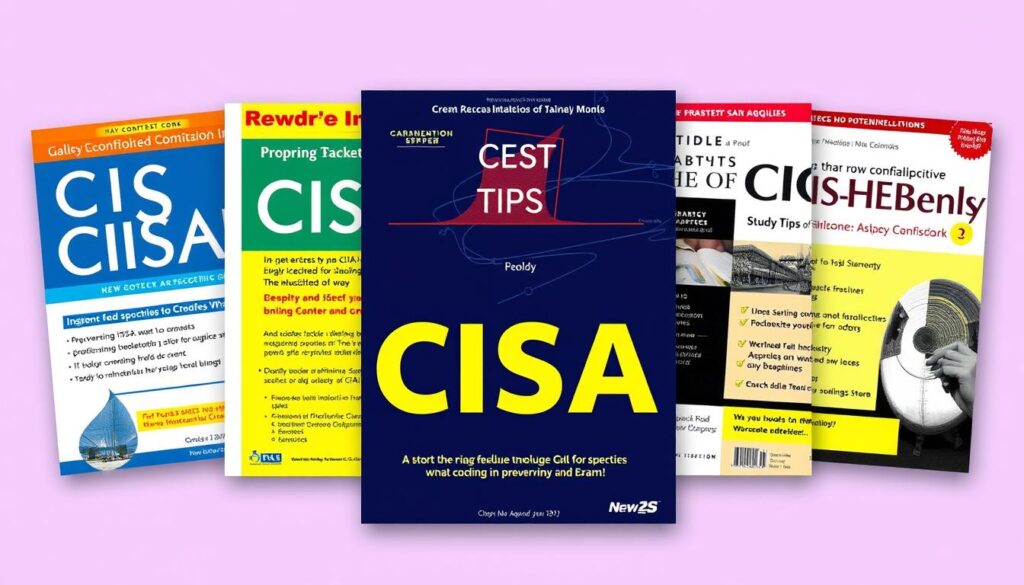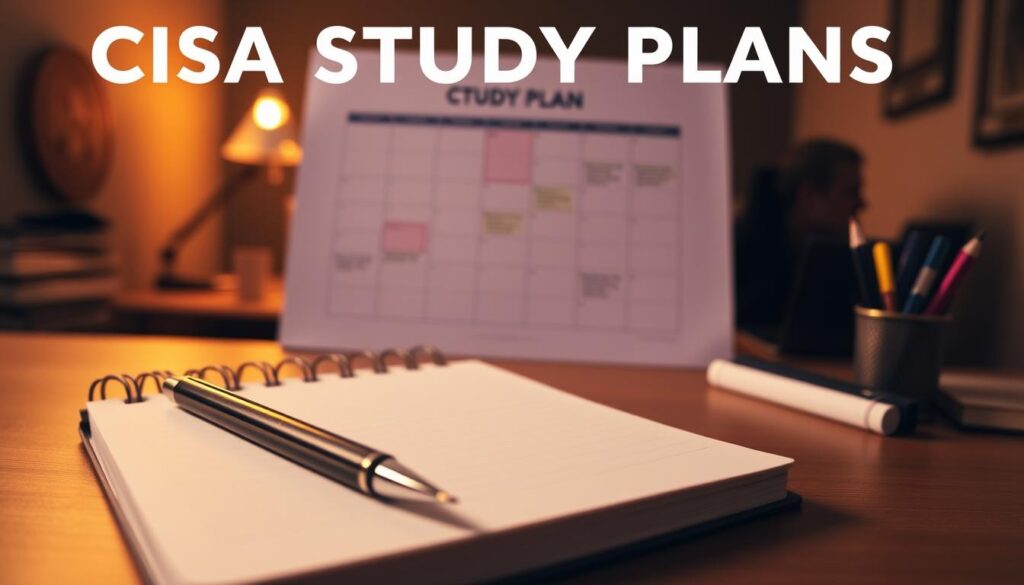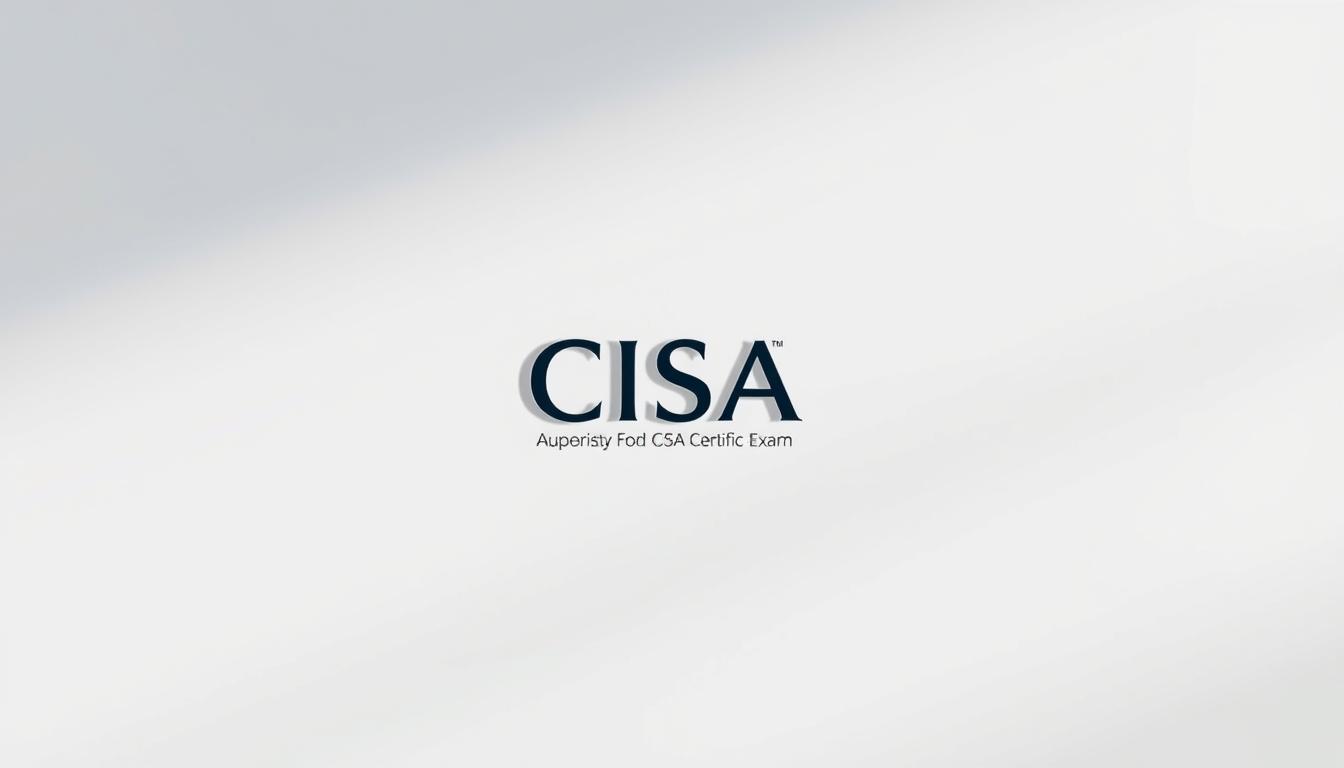The pandemic brought unprecedented challenges, including layoffs and pay cuts. However, for many, it was a wake-up call to invest in their future. One such opportunity is becoming a Certified Information Systems Auditor (CISA), a globally recognized certification that can significantly enhance your career prospects in IT audit, security, and governance.
Achieving CISA certification demonstrates your expertise in auditing, controlling, and securing information systems. It’s a highly respected credential in the IT industry, opening doors to new career opportunities and advancement.
With the right preparation and study materials, you can pass the CISA exam on your first attempt. This comprehensive guide will walk you through the preparation process, covering essential topics and study strategies to help you succeed.
Key Takeaways
- Understand the importance and benefits of CISA certification for your IT career.
- Learn how to develop an effective study plan for the CISA exam.
- Discover the best study materials and resources for CISA preparation.
- Gain insights into time management techniques and mental preparation for the exam.
- Explore strategies to help you confidently pass the CISA exam on your first try.
Understanding the CISA Certification and Its Value
As you consider advancing your career in IT audit, governance, or security, understanding the CISA certification is crucial. The CISA exam is not just another certification; it’s a validation of your expertise in information systems auditing, control, and security.
What is the CISA Certification?
The CISA certification is a credential offered by ISACA that recognizes your knowledge and application of information systems auditing, control, and security standards. It signifies that you possess the skills necessary to assess the effectiveness of information systems controls and identify vulnerabilities.
CISA certification is ideal for professionals working in or aspiring to work in roles related to information systems auditing, security, governance, or risk management. It is particularly valuable for those who need to bridge the gap between technical IT knowledge and business management concerns.
Career Benefits of Becoming CISA Certified
Becoming CISA certified can open new career opportunities and enhance your professional credibility. Here are some key benefits:
- CISA certification demonstrates your commitment to excellence in information systems auditing and security.
- It validates your knowledge and skills in evaluating the effectiveness of information systems controls.
- CISA certified professionals are recognized globally, enhancing your career prospects.
- The certification is particularly valuable for professionals looking to transition into IT audit or governance roles.
Is CISA Right for You?
Before committing to the CISA certification, it’s essential to assess your motivation and career goals. Consider whether you have experience or interest in evaluating information systems controls, assessing compliance with regulations, or improving organizational IT governance.
Successful CISA candidates typically have a clear professional goal or passion for the field beyond just adding credentials to their resume. The certification requires ongoing commitment to maintaining it through continuing professional education, making it best suited for those planning a long-term career in information systems assurance.
If you’re at a career crossroads and considering specialization in IT audit or governance, CISA can provide the structured knowledge framework and professional recognition to facilitate that transition.
Breaking Down the CISA Exam Structure
Breaking down the CISA exam structure is key to developing a successful study plan. The CISA exam is a comprehensive assessment that evaluates your knowledge and skills in information systems auditing, control, and security.
The Five CISA Domains Explained
The CISA exam is divided into five domains, each covering a specific area of information systems auditing, control, and security. These domains are:
- Domain 1: Auditing Information Systems (21% of the exam questions)
- Domain 2: Governance and Management of IT (17% of the exam questions)
- Domain 3: Information Systems Acquisition, Development, and Implementation (12% of the exam questions)
- Domain 4: Information Systems Operations, Maintenance, and Service Management (23% of the exam questions)
- Domain 5: Protection of Information Assets (27% of the exam questions)
Understanding the weightage of each domain helps you allocate your study time effectively.
Exam Format and Scoring System
The CISA exam consists of 150 multiple-choice questions, and you have four hours to complete it. The exam questions are designed to test your knowledge, understanding, and application of the concepts related to the five domains.
The scoring system is based on a scale of 200-800, with 450 being the minimum passing score. To pass the CISA exam, you must achieve a scaled score of 450 or higher, which typically translates to correctly answering about 75% of the questions.
Passing Requirements
To become CISA certified, you must not only pass the exam but also meet the experience requirements. You need a minimum of five years of professional experience in information systems auditing, control, or security. However, certain educational backgrounds and related work experience can substitute for up to three years of this requirement.
All experience must be verified and gained within the ten years preceding the application date or within five years from the date of passing the exam. Additionally, you must adhere to ISACA’s Code of Professional Ethics and Information Systems Auditing Standards.
After passing the exam, you must submit an application for certification, including detailed work experience verification and payment of a certification fee. To maintain your certification, you are required to complete a minimum of 20 continuing professional education (CPE) hours annually and 120 hours over a three-year period.
Essential CISA Study Materials and Resources
A well-prepared CISA candidate knows that the right resources make all the difference. To help you achieve your certification goals, we’ve compiled a list of essential study materials and resources.
Official ISACA Resources
ISACA provides a range of official study materials that are highly recommended for CISA exam preparation. These include the CISA exam candidate guide, sample questions, and webinars that offer valuable insights into the certification process and exam content.
The CISA Review Manual is a comprehensive resource that covers all five domains of the exam. You can access these resources directly through ISACA’s official website.
Third-Party Study Guides and Books
In addition to official ISACA resources, several third-party study guides and books can supplement your study plan. Some of the best CISA exam books are available on platforms like Amazon.

Online Courses and Training Programs
CISA online training courses offer flexibility and structured learning. These courses are designed to help you understand complex concepts and provide practice tests to assess your knowledge.
Platforms like Coursera, Udemy, and edX host various CISA training programs. You can choose a course that fits your learning style and schedule.

Free and Budget-Friendly Resources
If you’re on a tight budget, there are still numerous free and low-cost resources available. YouTube channels like Hemang Doshi’s offer clear explanations of key CISA concepts.
Other resources include:
- Online forums and communities such as Reddit’s r/CISA and TechExams.net.
- Free or low-cost mobile apps like CISA Exam Prep and CISA Practice Exams.
- Public libraries often provide access to digital learning platforms like LinkedIn Learning or O’Reilly.
- Trial versions of premium CISA study platforms.
These resources can be incredibly helpful in your CISA exam preparation journey.
How to Prepare for and Pass the CISA Exam on Your First Try
The path to becoming CISA certified involves more than just studying hard; it demands a smart and focused preparation strategy. As a working professional, you’re likely juggling multiple responsibilities while preparing for the exam. To succeed, you need to make the most of your study time.
To start, it’s essential to understand that successful CISA candidates typically dedicate 10-15 hours per week to studying. This requires careful planning to balance your professional responsibilities, personal commitments, and exam preparation. Effective time management is crucial to your success.
Setting Clear Goals and Expectations
Begin by setting clear goals and expectations for your CISA preparation journey. Communicate your CISA goals with your family, friends, and colleagues to gain their support and understanding during this intensive preparation period. This may require temporary adjustments to your social commitments, so it’s vital to be upfront about your needs.
- Identify your most productive times of day for studying complex material.
- Protect these time blocks in your calendar to ensure consistency.
- Leverage “hidden” study opportunities throughout your day.
Creating a Realistic Timeline
Creating a realistic timeline is vital to your CISA preparation. Break your study sessions into manageable chunks of 25-50 minutes, followed by short breaks. Techniques like the Pomodoro method can help maintain your focus and prevent burnout.
Consider negotiating with your employer for study leave, flexible working hours, or reduced responsibilities as your exam date approaches. This can be particularly beneficial if the CISA certification will benefit your organization.
Balancing Work, Life, and Study
Maintaining a balance between work, life, and study is critical. Regular exercise, adequate sleep, and stress management techniques are essential for retaining information and performing well on exam day. Create a dedicated study space free from distractions to maximize your study time efficiency.
By implementing these strategies, you’ll be well on your way to passing the CISA exam on your first attempt. Remember, the key is to study smarter, not harder.
Developing an Effective CISA Study Plan

Your journey to CISA certification starts with assessing your knowledge and creating a tailored study plan. To achieve success in the CISA exam, it’s essential to have a clear understanding of your strengths and weaknesses.
Assessing Your Current Knowledge
Begin by evaluating your current level of knowledge across the five CISA domains. This initial assessment will help you identify areas that require more focus and attention. Be honest with yourself about your knowledge gaps, as this will form the foundation of your study plan.
One effective way to assess your knowledge is by taking a diagnostic test or quiz that covers all the CISA domains. This will give you a clear picture of where you stand and what you need to work on.
Creating a Structured Study Schedule
Once you have identified your knowledge gaps, it’s time to create a structured study schedule. Allocate specific time slots for studying each domain, ensuring that you cover all the necessary material before the exam.
A suggested approach is to alternate between different study materials and techniques to avoid ‘reading fatigue’. For instance, you can switch between reading study guides, watching video tutorials, and practicing with sample questions.
- Regularly evaluate the effectiveness of your study methods and be willing to pivot if certain approaches aren’t yielding results.
- Combat reading fatigue by alternating between different learning modalities.
- Adjust your study schedule to accommodate unexpected work demands or personal commitments.
Tracking Your Progress
Tracking your progress is crucial to staying on course with your study plan. Regularly review your performance on practice tests and adjust your study schedule as needed. This will help you stay focused on areas that require improvement.
Maintaining a study log or journal can also be beneficial. It allows you to reflect on your progress, identify patterns, and make informed decisions about your study plan.
Adjusting Your Plan as Needed
Be prepared to make adjustments to your study plan as you progress. If you find that certain study methods are not working for you, don’t hesitate to try alternative approaches. This flexibility is key to ensuring that you stay on track and make the most of your study time.
By following these steps and maintaining a flexible and responsive study plan, you’ll be well-prepared to tackle the CISA exam with confidence.
Proven Study Techniques for CISA Success
The path to CISA certification involves more than just studying hard; it requires smart, targeted learning strategies. To help you prepare effectively, we’ve outlined several proven study techniques that can enhance your understanding and retention of the material.
Active Learning Strategies
Active learning is a powerful approach to studying for the CISA exam. It involves engaging with the material beyond just reading or listening. You can implement active learning by summarizing key points in your own words, creating concept maps, or making flashcards to help reinforce your memory. Engaging actively with the study material can significantly improve your ability to recall information during the exam.
Effective Note-Taking Methods
Developing an effective note-taking system is crucial for organizing the vast amount of information you’ll encounter during your CISA exam preparation. Consider using a method like the Cornell Notes system, which involves dividing your paper into sections for notes, summaries, and review. This structured approach can help you review and reference your notes more efficiently.
Memory Techniques for Complex Concepts
Some concepts in the CISA exam may seem complex or difficult to remember. To overcome this, you can use memory techniques such as mnemonics or acronyms to help encode information in a more memorable way. For example, creating a story or sentence where the first letter of each word corresponds to the first letter of a concept or process can be an effective memory aid.
Study Groups and Accountability Partners
Joining or forming a study group can be a highly effective way to stay motivated and gain insights from others preparing for the CISA exam. When forming a study group, look for 3-5 members with diverse professional backgrounds but similar exam timelines. Establishing clear expectations for study sessions, such as preparation requirements and discussion topics, can ensure productive meetings. Consider implementing a “teach-back” method where each member becomes an expert on a specific topic and teaches it to the group. You can also benefit from using collaborative tools like shared document repositories and study schedules to maintain organization. Additionally, finding an accountability partner or participating in online CISA communities through platforms like ISACA’s Engage, Reddit, or LinkedIn can provide valuable support and insights. Collaborating with others can not only enhance your understanding but also provide the motivation needed to stay on track with your study plan.
Mastering CISA Practice Questions
The key to success in the CISA exam lies in mastering a wide range of practice questions. As you prepare, you’ll find that practice questions are not just a tool for assessment but a learning mechanism that deepens your understanding of the exam content.
Why Practice Questions Are Essential
Practice questions are essential because they help you gauge your knowledge, identify weak areas, and get familiar with the exam format. By regularly practicing with high-quality questions, you can significantly improve your chances of passing the CISA exam on your first attempt.
Regular practice also enhances your ability to manage time effectively during the actual exam, reducing stress and improving overall performance.
Sources for Quality Practice Questions
To maximize your preparation, it’s crucial to use high-quality practice questions. You can find these through official ISACA resources, third-party study guides, and online courses. When searching for CISA practice exam questions, ensure you’re using reputable sources to avoid misleading or incorrect information.
Analyzing Your Performance on Practice Tests
After taking practice tests, it’s vital to analyze your performance thoroughly. Identify the areas where you struggled and review those topics in depth. This targeted approach helps you make the most of your study time and improves your weak areas.
Creating Your Own Question Bank
Developing your own CISA question bank can be a highly effective study strategy. By transforming complex concepts into potential exam scenarios, you engage actively with the study material and deepen your understanding.
- Develop questions that target your weak areas, focusing on challenging concepts or less abundant topics.
- Create questions at varying difficulty levels to simulate the actual exam experience.
- Include detailed explanations for both correct and incorrect answers to enhance your understanding.
- Regularly revisit and refine your question bank to keep it relevant and challenging.
- Exchange your questions with study partners to gain different perspectives.
Using your personal question bank as a quick review tool can be particularly effective during short study sessions or when reinforcing specific concepts.
One Month Before the Exam: Final Preparation Strategies

As you enter the final month before the CISA exam, it’s crucial to refine your preparation strategy. You’ve likely been studying for a while, but this period is critical for intense focus and adjustment. With a structured approach, you can ensure that you’re as prepared as possible for the exam day.
Focused Review of Weak Areas
At this stage, it’s essential to identify and concentrate on your weak areas. Review your past study sessions and assessments to pinpoint topics that need more attention. Allocate more time to these areas, and use targeted resources to improve your understanding.
Consider using active recall techniques such as flashcards or practice quizzes to reinforce your learning. This study technique can help solidify your grasp on challenging concepts.
Full-Length Practice Exams
One of the most effective ways to prepare for the CISA exam is by taking full-length practice exams. These exams simulate the actual test experience, helping you get accustomed to the format and time constraints. Analyze your performance on these practice exams to identify areas for further improvement.
Make sure to review your answers, understanding not just the correct responses but also the reasoning behind them. This will help you study more effectively and retain information better.
Mental and Physical Preparation
In the final month, it’s not just about study; it’s also about preparing yourself mentally and physically. Gradually adjust your sleep schedule to ensure you’re alert during your exam time. Implement stress-reduction techniques like deep breathing or meditation to manage anxiety.
- Maintain a balanced diet rich in brain-supporting foods like omega-3 fatty acids and antioxidants.
- Practice visualization techniques, imagining yourself performing well on the exam.
- Prepare a “mental reset” strategy to handle difficult questions or rising anxiety.
By focusing on these areas and maintaining a consistent study routine, you’ll be well-prepared for the CISA exam. Remember, the goal is to feel confident and ready, having utilized your study time effectively.
Exam Day: Strategies for Success
Success in the CISA exam requires more than just knowledge; it demands a well-thought-out strategy for exam day. As you sit for the exam, having a clear understanding of what to expect and how to manage your time effectively can significantly impact your performance.
Preparation is Key
Before diving into the exam, it’s essential to know what to bring and what to expect. Ensure you have all the necessary materials, such as your admission ticket and identification, and understand the exam format and timing.
- Arrive early at the exam center to avoid any last-minute stress.
- Familiarize yourself with the exam software or format to minimize surprises during the exam.
- Understand the rules and regulations of the exam center.
Managing Your Time Effectively
Time management during the exam is crucial. The CISA exam is timed, and you need to allocate your time wisely across all questions. Practice time management techniques during your practice exams to get a feel for the pacing required.
- Allocate your time based on the number of questions and their complexity.
- Don’t spend too much time on a single question; mark it and return to it later if needed.
- Keep an eye on the clock to ensure you’re on track to complete the exam within the given time.
Handling Difficult Questions
Encountering difficult questions is inevitable, but knowing how to handle them can make a significant difference. Read each question carefully, paying particular attention to qualifying words that can change the context entirely.
- Pay attention to words like “MOST,” “BEST,” “LEAST,” and “EXCEPT,” as they often determine the correct answer.
- Use the process of elimination to narrow down your options.
- If unsure, make an educated guess, as there’s no penalty for incorrect answers on the CISA exam.
By following these strategies, you can approach the CISA exam with confidence and maximize your chances of success.
After the Exam: Certification Process
The journey to becoming CISA certified doesn’t end with passing the exam; it continues with the certification process. Now that you’ve successfully passed the CISA exam, you’re on the final stretch towards achieving your certification.
Understanding Your Results
After completing the exam, you’ll receive your results. If you’ve passed, you’ll be one step closer to becoming CISA certified. However, passing the exam is just the first part of the certification process.
Completing the Certification Requirements involves several key steps. To finalize your certification, you’ll need to submit an application through the ISACA website within five years of passing the exam. This application requires detailed documentation of your work experience in information systems auditing, control, or security.
- Ensure you meet the five-year professional experience requirement across at least two of the five CISA domains. Note that there are potential substitutions for education and related experience.
- Have your work experience verified by supervisors or CISA-certified professionals who can attest to the accuracy of your role descriptions and responsibilities.
- Agree to the ISACA Code of Professional Ethics by completing and signing the relevant agreement, committing to maintain the highest standards of conduct and integrity in your professional practice.
- Pay the CISA certification processing fee, which is approximately $50 for members and $75 for non-members, to finalize your application.
The verification and approval process typically takes 2-3 weeks, after which you’ll receive official notification of your certification status. Once certified, it’s essential to begin tracking your continuing professional education (CPE) hours immediately, as you’ll need to report a minimum of 20 hours annually and 120 hours over a three-year period to maintain your credential.
Conclusion
With your CISA certification within reach, you’re not just passing an exam; you’re validating your expertise as an information systems auditor. The journey to this achievement requires dedication, strategic preparation, and perseverance, but the career benefits and personal satisfaction make the effort worthwhile.
Earning your CISA credential represents a significant professional achievement that demonstrates your commitment to the field. Successful candidates consistently cite a structured study plan, regular practice with exam-style questions, and a balance of official and supplementary resources as key factors in their success.
As you move forward with your CISA credential, consider how you might contribute to the profession through mentoring future candidates or advancing industry standards and practices. The CISA certification opens doors to advanced career opportunities and higher compensation, with certified professionals reporting increased recognition from employers and clients.
Remember, passing the exam is just the first step; maintaining your certification through continuing education ensures your knowledge remains current in this rapidly evolving field. Whether you utilized premium resources or budget-friendly alternatives, your CISA certification represents the same level of achievement and professional recognition.
In a world increasingly dependent on secure, well-governed information systems, CISA-certified professionals play a crucial role in ensuring organizational integrity and public trust. As you conclude your journey to CISA certification, you’re not just achieving a credential; you’re enhancing your career and contributing to the field’s integrity.
